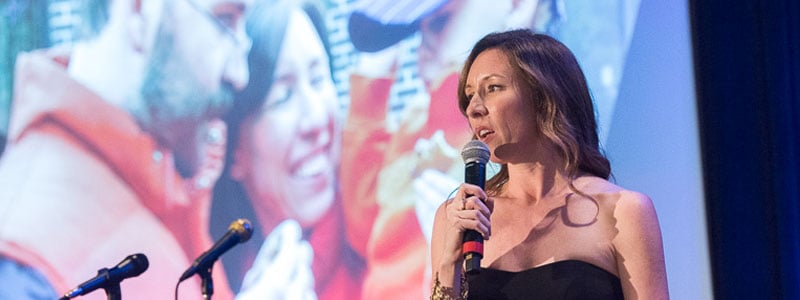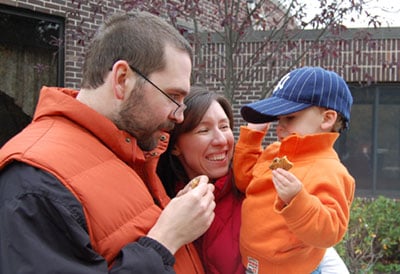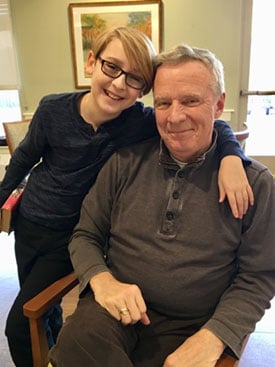 Katie Brandt shares her family's journey with young-onset dementia at the 2019 gala event to benefit the Mass General Hospital Frontotemporal Disorders Unit.
Katie Brandt shares her family's journey with young-onset dementia at the 2019 gala event to benefit the Mass General Hospital Frontotemporal Disorders Unit.
At the start of 2009, Katie Brandt’s life was the picture of happiness. She was married to her college sweetheart, Mike. The couple, both 29, had just started a family with the arrival of their son Noah the year before. Katie was a devoted daughter to her own parents, and enjoyed her career as an evaluation specialist for the state child welfare agency.
But in the space of just 3 short weeks an unfathomable chain of events forever changed Katie’s life...
It was the end of February when Mike was diagnosed with Frontotemporal Degeneration (FTD), a form of dementia. Just four days later, Katie’s mother passed away suddenly from a heart attack. And unbelievably, just 17 days after that her 59-year old father was diagnosed with early-onset Alzheimer’s Disease.
In the months and years that followed, Katie was left to deal with immense grief while also acting as caregiver for not only her young son but also her husband and her father. She quit her job, moved in with her dad, and for the next four years she was the full-time caregiver her family needed. She quickly found that she couldn’t safely care for two adult men with dementia and her infant son at the same time, so she found a neurorehabilitation center not far from her father’s house to help care for Mike.
“It was a trial by fire entry into the world of caregiving,” Katie says.
Although her story is one of immeasurable loss and sadness, the path she has chosen to take in the wake of her loss has also made it a story of incredible courage, love, learning, growing and now, inspiration for others. As she writes on her blog at loveisoutthereftd.org:
“Carried by the current of swift and irrevocable change, I recognized early on that I wouldn’t be able to swim against the tide. So, I learned to ride the wave.”
“When my husband passed away, I had so much energy from the grief that experience caused that I felt this need to take that and do something positive with it. When my son started kindergarten and dad began an adult day program, I was able to turn my attention to meaningful work in the field of dementia and caregiving.”
Katie is the Director of Caregiver Support Services and Public Relations for Massachusetts General Hospital’s Frontotemporal Disorders Unit. She’s also Co-Chair of the National Alzheimer’s Project Act (NAPA) Advisory Council on Alzheimer’s Research Care and Services, and an FTD Caregiver support group facilitator in Boston for the Association for Frontotemporal Degeneration (AFTD).
Through those roles she has channeled both her grief and her love into providing invaluable support for others who find themselves dealing with the experience of caring for a loved one with dementia.
This content is brought to you by The Memory and Aging Program at Butler Hospital, a world-leading center of Alzheimer's and dementia research located in Providence, Rhode Island. Learn more about the program and how to get involved at butler.org/memory.
FEELINGS FIRST
One of the things that helped me as I was interacting with my husband was approaching situations with the idea of “feelings first.” My biggest goal was always to connect with him emotionally and to promote a positive feeling. I definitely didn’t get it right all the time, but the great news is there’s always an opportunity for a do-over, sometimes literally within minutes.
For example, I might say to him, “Let’s put a sweatshirt on because it’s cold outside.” If I approached him with the sweatshirt and tried to do it in a hurry because I was in a rush and that didn’t go so well, I could put the sweatshirt down and then approach him again. Maybe the second time around I might start with a big smile and a hug. I might say “I found the sweatshirt you wanted!” and then guide him one step at a time. It surprised me how more than anything else, adding positive emotions to my actions was one of my most valuable tools in helping Mike and Dad get through their days.
 Katie's son Noah says that this is his favorite family picture (taken when he was just 2 1/2) because he and his dad are both wearing their favorite color, orange.
Katie's son Noah says that this is his favorite family picture (taken when he was just 2 1/2) because he and his dad are both wearing their favorite color, orange.
One of the other big things that comes up a lot when I work with families is this idea of the promise. A loved one might say, “I promised to keep my loved one at home.” I want to acknowledge that our healthcare workers, skilled nursing staff and memory care professionals can provide amazing supports to families caring for a loved one with dementia. It’s not a failure to choose to have a memory care program or skilled nursing facility as part of your care team. In fact, it can be a wonderful experience.
Because of Mike’s behavioral challenges and our son’s young age, it was incredibly difficult for me to have meaningful family visits without support. At each visit, a staff member would assist me in shared activities between Mike and Noah, help keep Mike engaged and even take family photos. By recognizing our family’s goals of care, they provided support that allowed us to facilitate family moments that built new memories of joy. They also helped me to continue to build and develop my relationship with Mike in new and different ways.
I work with caregivers who feel they’re not their loved one’s caregiver anymore if they have to reach out and get support from a residential program. You may not be the only caregiver, but you’re still the most important caregiver. By making decisions and providing loving support, you are contributing to their care.
It was an unexpected gift that when Mike moved into his skilled nursing facility that I could embrace my role as Mike’s wife again. When I was at home juggling laundry, meals, medication, behavior management, and activities it made it so hard to also take that deep breath and just hold Mike’s hand. He loved Harry Potter, so I would read aloud to him when we were at the facility together. And it allowed me to focus on our relationship in a way that I didn’t have the bandwidth to do at home. There were people out there to help me do all those daily tasks of caregiving. But there was one thing that no one else could do. I was the only person who could be Mike’s wife.
I was able to care for my Dad at home for seven years. Today I’m so thankful to the staff in the memory care center where my dad now lives. Now he’s able to develop new relationships and enjoy activities with his peers. Dad is still a big part of our lives. We have FaceTime calls and visits all the time. There is a richness that’s been added to his life and I’m still a fully engaged caregiver.
I talk a lot about the importance of self-care, even if it’s just a few minutes to devote a little attention to yourself. Self-care was so easy to go by the wayside when I was a full-time caregiver. We know that caregiving can be a threat to your health because you may put off routine appointments or moments of rest. A moment of self-care for the caregiver can be critical to keep everything running for our whole family.
 Katie continues to be a caregiver to her dad (shown here with Katie's son, Noah) while he lives in a memory care assisted living program.
Katie continues to be a caregiver to her dad (shown here with Katie's son, Noah) while he lives in a memory care assisted living program.
One of the things that life has taught me is that there are a lot of unknowns. For me, living life in the present and focusing on building new memories of joy with the people that I love helped to mitigate some of those future worries. Being empowered with the knowledge about what I could do to promote brain health for myself and my family was also helpful.
Some caregivers worry about whether or not these conditions will be inherited by other family members. Families should know that there are amazing genetic counselors who can talk with you about genetic risk and predispositions for developing Alzheimer’s Disease or a related dementia. It’s important that if you have concerns, you reach out and talk with an expert. Make an appointment with a genetic counselor that has expertise in your loved one’s specific condition.
When I was learning how to be a caregiver, I read a lot, hoping to find a book that would help me connect with the emotional changes I was experiencing in my new role. Years into my journey, I came upon one book that spoke to me, Supersurvivors: The Surprising Link Between Suffering and Success, written by psychologists Lee Daniel Kravetz and David B. Feldman. This book is not even about caregiving, instead it focuses on how individuals cope in the wake of trauma. Kravetz and Feldman acknowledge the impact of suffering after trauma and how it can change the trajectory of an individual’s life forever. This resonated with me because I felt a deep sense of traumatic loss after my husband’s diagnosis and the demise of our dreams for a shared future. I saw myself as someone healing from a great wound. My suffering and grief were real and present, but so was my resilience. I was not weaker because of my trauma. In fact, I felt a fiery drive to do something with the energy that grief had created inside me.
Suddenly, I had an origin story.
Think about the origin stories of superheroes. Superman’s home planet is destroyed. Storm loses her family in the wake of war. Batman’s parents are killed by a violent criminal. Their stories begin with trauma. The difficult experiences create a new set of skills and a new determination to move forward with purpose. Resilience is about making a choice to take the next step. It looks different for everyone. For some of us, making the decision to get out of bed and face the day is an act of resilience. For others, it may mean a new calling. What matters is that you make a choice to continue to live your life in a way that brings you what you need.
I have met many resilient caregivers along my journey over the past decade. One common thread that I see amongst them is the ability to ask for help when they need it. We all need someone in our life who can tell us when it is time to take a break or accept support. Let others look out for you as you are looking out for your loved one. Taking breaks and practicing self-care can strengthen you for the important tasks of caregiving.
As you work to develop your advocacy skills in honor of your loved one, remember to use those same skills to advocate for yourself. Reach out and let people know about your circumstance so you can get support. Feel comfortable with letting people know what you’re going through and allow yourself to ask for that support in whatever way feels good to you. Reach out to a mental health professional for therapy. Seek out a support group that’s the right fit for you. And, sometimes it’s not about connecting with a whole group of people but meeting that one special person who you feel a kindred spirit with.
Even during COVID-19, there are many different ways to connect with others. The opportunities are robust, with virtual support groups, educational events and even Memory Cafes. Community isn’t cancelled. You don’t have to go it alone; you can bring a friend with you or make a new one along the way.
Remember, even Batman had Robin.
Learn more about Katie and her work at loveisoutthereftd.org.
To learn more about the Memory and Aging Program and how you can get involved, visit butler.org/memory.
Copyright © 2023 Care New England Health System